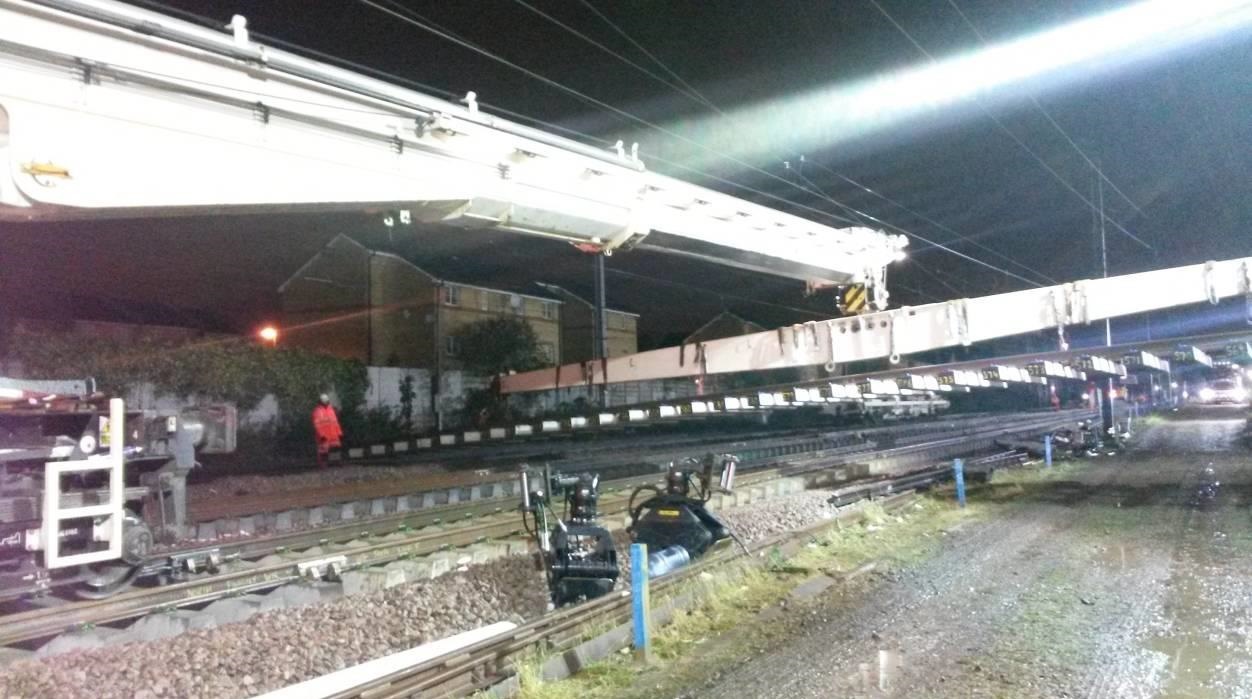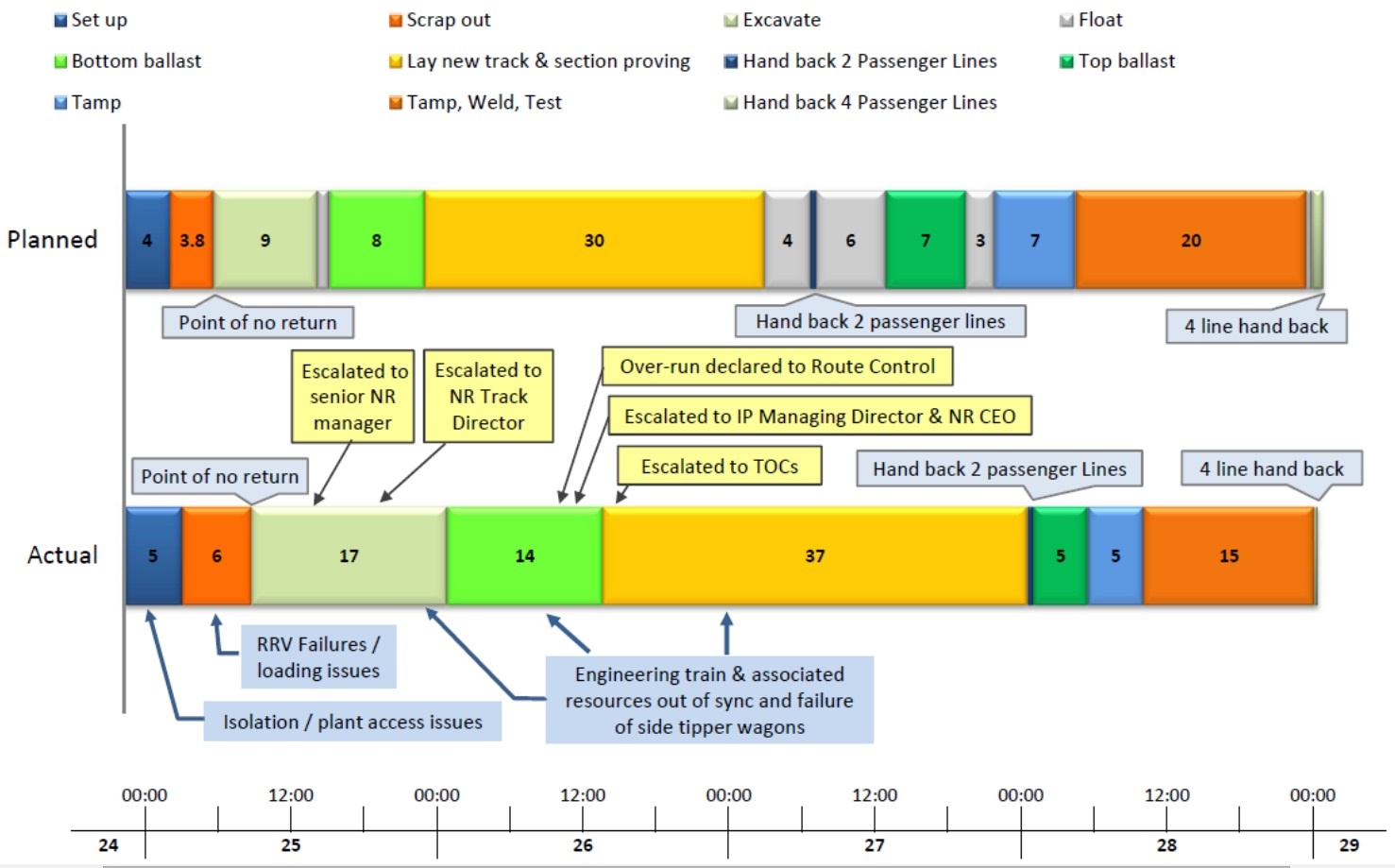12.01.15
Operational and managerial failures behind Christmas chaos – NR
A combination of factors, including ineffective contingency planning, poor communication, a lack of engineering train drivers and untested plant were at the heart of the King’s Cross and Paddington Christmas chaos, Network Rail has admitted.
The company’s report, ‘A review into the causes of passenger disruption affecting King’s Cross and Paddington stations’, revealed that there were shortfalls in the delivery of the projects and in the service recovery plans after over-runs were recognised at Holloway Junction and at Old Oak Common.
The causes of the delay on the Holloway Junction works on the East Coast Main Line north of King’s Cross were complex and created feedback loops of problems, while the over-running work at Old Oak Common affecting Paddington had just one key cause: safety validation checks on signalling took 10 hours instead of the predicted two.
The train operating companies (TOCs) were given around 14 hours advance warning of the over-run affecting King’s Cross, but no warning at Paddington.
During the work at Holloway Junction, where two of the junctions and 500m of the two railway lines between them were being replaced by an Alliance of Network Rail and its contractor AmeySersa, problems began when new, untested equipment, during the removal of the old ballast, scrap rails and sleepers, failed.

New hardware had been bought specifically to reduce the risk of breakdown – but it had not been tested in the live railway environment before deployment, and was not reliable when put to use, Dr Francis Paonessa, managing director of infrastructure projects at Network Rail, reported.
Relatively minor issues of malfunctioning equipment and plant eventually caused bigger problems, such as a lack of available engineering trains drivers at such a key time – with many of them having worked as many hours as they were allowed to, leaving important engineering trains in the wrong places at the wrong times, compounding the problems.

Network Rail added that during a conference call on the evening of 26 December, involving Network Rail, TOCs and British Transport Police, the decision was made by Network Rail to run as much of the scheduled train service on the 27 December as possible, but for trains to start and terminate north of King’s Cross, mainly at Finsbury Park.
This decision was made after balancing the disruption that would be caused by running services terminating at Finsbury Park, against the even greater disruption that would probably have been caused by cancelling services altogether.
Dr Paonessa wrote: “In this decision making, Network Rail was accountable for deciding if it was safe to run trains and for preparing the route plans. They acted on advice given by the TOCs regarding passenger handling and the capacity of the stations that they manage, along with advice from the British Transport Police (BTP) and other stakeholders.”
However, there were “mutual failings” in the communications between Network Rail and Govia Thameslink Railway (GTR), which manages Finsbury Park station, around the implementation of the contingency plan. A failure to operate a revised platform usage pattern was a significant contributor to the subsequent overcrowding, and was only corrected after three long distance trains had gone through the station.
Following the problems at Holloway Junction and Finsbury Park, Network Rail says the overall structure and content of project and operational contingency plans will be improved to ensure that minimising passenger disruption is at the very heart of its planning.
In addition, contractors will be required to test any new equipment in an off-the-railway environment before it is used on live railway work. A review will also be undertaken of Network Rail processes for communicating operational train service contingency plans to its own and other staff at short notice.
This is because the log grabs being used (pictured below), used to remove the scrap track and sleepers, "had never been operated" with the specific RRVs (road-rail vehicles) in use on the project. The report notes: "The brand new log grabs kept leaking hydraulic fluid, losing pressure and not working correctly. The on-site fitter was constantly working to fix these problems and delays mounted. The plant supplier had provided new log grabs to specifically reduce the delivery risk. However, the unintended consequence was to introduce a delivery risk because the grabs had never been operated with these specific RRVs."
Paddington disruption
Regards the Paddington problems, it was noted that between 24 December 2014 and 2 January 2015, Network Rail intended to replace and upgrade a 25 mile stretch of railway between Paddington and Maidenhead.
The work included the introduction of a brand new 1,750m long flyover and junction to enhance connections to Heathrow Airport; and major track layout, overhead line and signalling changes at Old Oak Common depot to allow this complex depot to be used by new trains – this was the item which overran on 27 December.
Network Rail blames the problems at Old Oak Common on signalling failures. Dr Paonessa reported that Signalling Solutions Limited (SSL), Network Rail’s appointed signalling framework suppliers, reported inaccurately that some works were complete.
“The cause of this was a combination of physical testing work needing to be redone or rechecked and inconsistencies in the paperwork needing to be resolved,” he said. “Additional site checks/tests on the main lines were required to be undertaken prior to the Safety Certification being issued.”
Network Rail says the major lessons from the passenger disruption include “thoroughly reviewing” future signalling testing with SSL, and providing additional contingency time for the validation process where major signalling works or multi-disciplined works are being undertaken.
Unfortunately, lessons learned after the "significant over-run" in SSL's commissioning of the new signalling systems for Poole to Wool in May 2014 were not enough to prevent problems occurring at Christmas.
The report explains: "At that time, the key issues identified were: there was no senior SSL management on site; progress reporting to Network Rail had been poor; and that this had been exacerbated by the SSL Office and the Network Rail Project Offices being geographically distanced."
Instead, for the Christmas works:
- The SSL operations director was present throughout the night of the key signalling commissioning on 26 December
- The SSL managing director was present during the morning of the intended handback of the railway on 27 December
- The SSL Office was adjacent to the Network Rail Project Office
- Two Network Rail staff were present in the SSL Office to facilitate communication
- A Network Rail signalling specialist was located in SSL’s offices in Derby for the three months running up to the commissioning to validate the robustness of the signalling data
The frustration felt among Network Rail staff and managers in not being able to get a clear timescale for the safety validation checks, once they began to over-run, is clear from Dr Paonessa's report.
SSL released a statement saying: "SSL welcomes this report and is continuing to work with Network Rail to consider how we can avoid similar issues arising in future. The main issue at Paddington related to vital safety checks being carried out on the signalling systems that ran late for a number of reasons. We obviously apologise to everyone affected by the delay but would stress that the safety and wellbeing of passengers was our paramount consideration at all times."
Recommendations
Mark Carne, chief executive of Network Rail, ahead of giving evidence to the Transport Select Committee this week, said: “A number of things went wrong in these two instances. In addition it is clear that our project back-up plans and the train service plans should have done a much better job in protecting the travelling public from our engineering problems.
He added that he “sincerely apologises” for the disruption over the festive period, and that Network Rail is determined to learn lessons from the failings at Christmas.
Transport secretary Patrick McLoughlin said: “I am grateful to Network Rail for this detailed and considered report into what went wrong with its engineering works over the Christmas period. I expect Network Rail to take the necessary steps to ensure its recommendations, and any further measures arising in the light of the separate report being prepared by the ORR, are adopted quickly and fully.”
To view the full report, click here. All pictures above extracted from the report, credit: Network Rail.
Tell us what you think – have your say below or email [email protected]